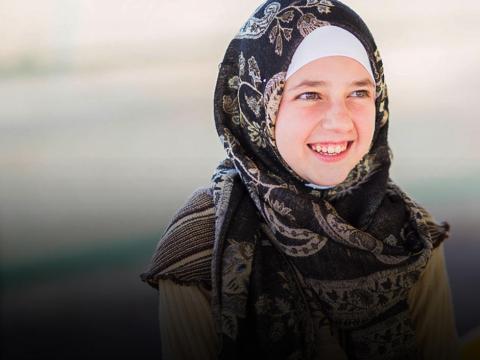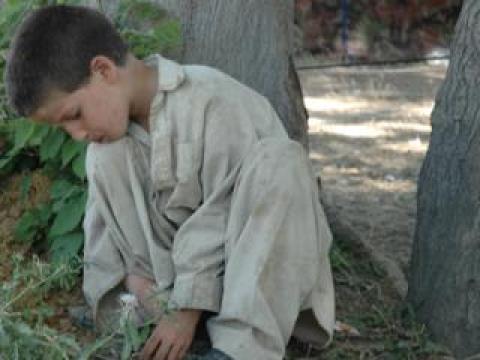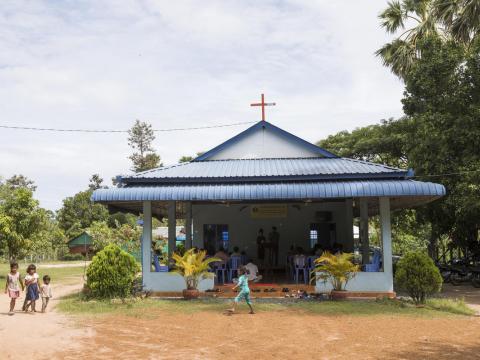
Open our eyes and minds to refugees; a faith perspective
By Esther Lehmann-Sow, Global Director of Faith and Development, World Vision International
As I write this, I am still struggling to come to terms with the news that in recent weeks, more than 150,000 people have had to flee their homes in north-western Syria. This is likely to be the second, third, maybe fourth or more time these people have lost what little they had as war continues to ravage their country.
These heart-breaking numbers are from just one part of one country in a seemingly ever expanding list of places where children and their families are being forced from their homes. This World Refugee Day the UN has reminded us that life changes in an instant every day; every minute, 20 people leave everything behind to escape war, persecution or terror. Roughly half of these are children. It is our natural reaction to want to find a way to forget about this, hope that it can’t be true, close our minds to what is going on because it is so difficult to do anything about it. As Christians, however, I believe we do not have a choice.
The Bible is openly biased towards refugees, strangers, the suffering – and God calls his followers to do likewise: ‘Do not mistreat or oppress a foreigner, for you were foreigners in Egypt... you yourselves know the feelings of a stranger, for you also were strangers in Egypt’ (Exodus 22:21; 23:9).
We won’t understand God’s bias and his command of care for the suffering if we don’t understand God as the one who created each and every human being, be they close or far, well off or needy, Christians or not.
We believe God sustains their every breath, knows each by their names, understands every fibre of their life and the happenings of each moment. The dignity God bestows on each girl, boy, woman and man means that he personally is concerned for each of them, feels their pain, sees their tears, hears their cries, and feels the weight of fear and desperation on their heart.
As a Christian humanitarian, I believe the very moment God aches with those suffering pain and loss, he also looks at us, whose breath he sustains and whose hands he fills so that we would share with those who lack.
He waits for us to live up to what he has required of all of us: to act justly, to love mercy and to walk humbly before God (Michah 6:8). The early Church was instructed to pursue equality through generosity: ‘At the present time your plenty will supply what they need, so in turn their plenty will supply what you need. Then there will be equality.’ (2Cor 8:14).
It feels like a sacred interdependency: those who lack find help and hope through the support they receive, those who share what they have find freedom and joy in doing so. And both experience the gift of restored identity and relationships.
In World Vision, we invite our supporters to be a part of that giving, to give what they can to enable our frontline work with refugees to carry on wherever those forced from their homes may find themselves.
We and other faith groups and communities are on the frontlines, contributing to the immediate physical needs as well as the spiritual and psychosocial needs of children and their families who have been displaced.
As Jean Duff, president of the Joint Learning Initiative on Faith and Local Communities, wrote in a recent article about the role of faith-based organisations in the global refugee response: “Stereotypes unfairly paint all faith-based aid as conditional, subject to proselytizing or discriminatory theology. It is also true that some faith communities will rush in with food, care, and compassion without knowing ‘best practices’.”
Proselytism requires a profession of faith in exchange for aid or services. World Vision does not proselytise. While we are always ready to say that Jesus is the reason we do the work we do, we never withhold aid or services for a profession of faith. In fact, we serve everyone we can, of any faith — or no faith — and work carefully within cultural contexts to build respectful interfaith relationships.
Refusing to close our minds to stories about more displacement, or perhaps taking steps to meet refugees in our own neighbourhoods, is an invitation from God to embrace our shared dignity as humans, extend his care to them, and share in his joy of restored identity and relations.
Let’s not miss this opportunity.

